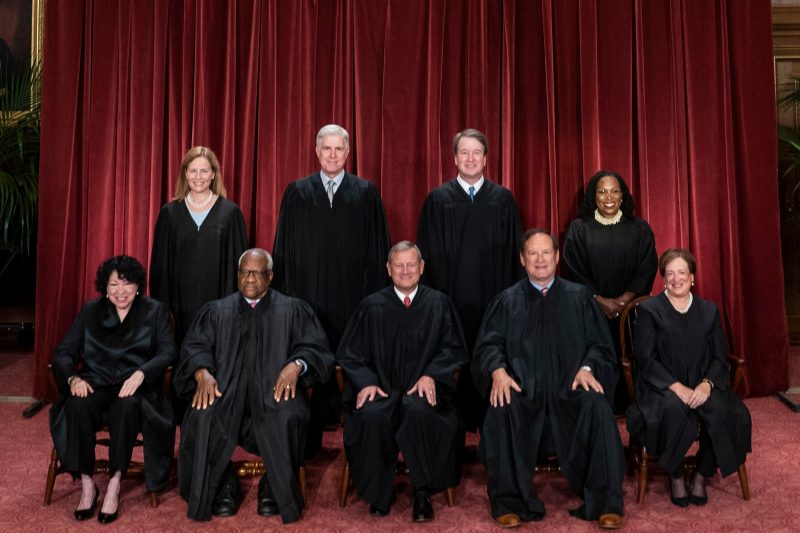The Supreme Court on Monday said it will consider South Carolina’s attempt to reinstate a congressional redistricting plan that a lower court found had “exiled” 30,000 Black voters to create a district safer for a White Republican candidate.
South Carolina has asked the court to schedule oral arguments at the beginning of its new term in October and issue a decision by Jan. 1 so the 2024 elections can proceed smoothly.
A three-judge panel in January said the plan by the Republican-led legislature split Black neighborhoods in the Charleston area to create a “stark racial gerrymander.” After the changes, Rep. Nancy Mace (R) coasted to victory over a Democratic opponent, securing what has become a Republican-dominated 6-to-1 congressional delegation in the state.
The judges found that South Carolina’s mapmaker tried to keep the African American population below a certain target in the district, treating Charleston County “in a fundamentally different way than the rest of the state.”
“The strategies he employed ultimately exiled over 30,000 African American citizens from their previous district and created a stark racial gerrymander of Charleston County and the City of Charleston,” said the panel, which was composed of two judges nominated by President Barack Obama and one by President Biden.
The judges, quoting from testimony at trial, found that the changes “were ‘dramatic’ and ‘created tremendous disparity’ in the placement of African Americans” in two congressional districts, including the district represented by Rep. James E. Clyburn, the House assistant Democratic leader.
After the panel rejected the map, South Carolina asked the Supreme Court to step in, saying that maintaining Republican dominance was the reason for the changes, not race. And it said the changes were partly to protect Clyburn, whose district had lost population over the past decade. The state’s petition quoted one Republican legislator as saying: “Jim Clyburn has more influence with the Biden Administration perhaps than anyone in the nation, because he probably wouldn’t be president if it weren’t for Jim Clyburn.” The state senator added, “I’m tickled to death that Jim Clyburn represents Charleston County.”
South Carolina said the three-judge panel’s “thinly reasoned order” rejecting the map unlawfully presumes bad faith on the part of the legislature and confused the racial effect of the changes with intent to discriminate.
The Supreme Court has said that partisan gerrymandering is not an issue for federal courts to decide but that attempts to discriminate on the basis of race are unconstitutional. The fact that Black voters lean dramatically toward the Democratic Party often makes for legal battles after the redistricting that follows every decade’s new census.
Redistricting challenges are heard by special three-judge district court panels, usually made up of a combination of district and appellate judges. Any appeal of a decision by those panels goes directly to the Supreme Court. In South Carolina’s case, the three-judge panel rejected racial gerrymandering challenges to two of the state’s seven congressional districts and agreed with one.
The Supreme Court in such redistricting cases is obliged to either affirm the decision of the special three-judge panel, overturn it or schedule it for full briefing and argument, as it did in this case.
The justices are separately considering a case that challenges a lower court’s decision that Alabama must create a second congressional district, out of seven, in which an African American candidate would have a good chance of being elected. The charge there is that the Voting Rights Act is violated when minority voters are packed into one district and then spread in small numbers among other districts so that their voting power is diluted.
A decision in the Alabama case should come before the court adjourns for its summer recess at the end of June.
The new case is Alexander v. the South Carolina State Conference of the NAACP.
Also on Monday, the court added to its caseload for next term a dispute between members of Congress and executive branch agencies about demands for information, an argument arising from requests for documents related to the former Trump International Hotel.
The case involves a 1928 law that allowed a minority — seven members — of the House Oversight and Reform Committee to request and receive information from executive agencies. But the General Services Administration turned down the request from a group of Democrats for details of the 2013 deal that allowed Donald Trump’s company to lease the Old Post Office building to turn it into a hotel.
Much of the lawsuit is now moot: The hotel has been rebranded as a Waldorf Astoria, and the most inquisitive lawmakers are no longer in Congress.
But the Biden administration asked the court to take up the case to wipe out a ruling of the U.S. Court of Appeals for the D.C. Circuit that said the lawmakers had the right to sue for the information.
The decision “conflicts with this Court’s precedents and contradicts historical practice stretching to the beginning of the Republic,” U.S. Solicitor General Elizabeth B. Prelogar wrote in her petition to the court. She said the law’s “ostensible purpose is to facilitate the work of the Committee and the whole House, not to provide a perquisite to individual Members.”
The case is Carnahan v. Maloney.








